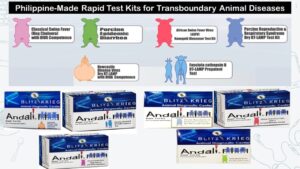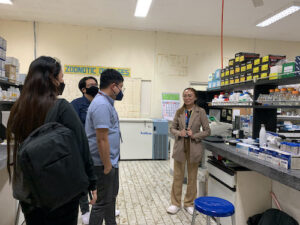Blitzkrieg Animal Diagnostic Center launches a budget-friendly test kit to detect antibodies in livestock

NUEVA ECIJA, Philippines — Blitzkrieg Animal Diagnostic Center has recently developed “ANDALI” test kits to detect viral antigens in swine such as the African Swine Fever (ASF), Porcine Epidemic Diarrhea (PED), Porcine Reproductive and Respiratory Syndrome (PRRS), and Classical Swine Fever (CSF), and Newcastle Disease (NCD) in poultry which are highly contagious diseases in the country.
In the 2016-2022 Livestock and Poultry Statistics Report released by the Philippine Statistics Authority, hogs are the top animal industry commodity in terms of production value which distinctively accounts for almost 2.14 million metric tons. A lot is on the line based on this data, both lives and livelihood, whenever a biosecurity challenge would hit our country.
Unfortunately, the Philippines was one of the first Southeast Asian countries to have confirmed the African Swine Flu outbreak in July 2019. To date, 53 out of the 81 provinces in the country have experienced ASF outbreaks which led to almost Php 100 billion losses in the hog-raising sector. Stabilizing transboundary animal diseases like ASF has been arduous especially when the supposed strict implementation of biosecurity measures has not been properly enforced. However, in a statement made by the Samahang Industriya ng Agrikultura (SINAG) in an interview, the country’s recovery from ASF will be in full swing before 2024.
The said animal disease taught us the hardest lesson, which is to diligently implement biosecurity surveillance and interventions both in commercial and backyard settings. Should these measures have been in place early on, we could have mitigated the irreversible impacts on people, communities, economic growth, and livelihood systems.
Innovation amidst the biosecurity crisis
A seasoned researcher, innovator, teacher, and veterinarian by profession has taken a brave leap by spearheading the development of an affordable and easy-to-use testing technology that can help the hog-raising communities in livestock pathogen diagnostics. She is Dr. Clarissa Yvonne Jueco-Domingo, the founder and director of Blitzkrieg Animal Diagnostic Center. She is an educator and a renowned researcher with remarkable expertise in assembling optimized molecular and nanotechnology diagnostic protocols. Her professional career spans over three (decades which includes teaching at the College of Veterinary Science and Medicine of Central Luzon State University in the Science City of Muñoz, Nueva Ecija. She finished her veterinary medicine degree, master of public health, and doctor of public health at the University of the Philippines.

Dr. Domingo knew the social, economic, and health impacts of these outbreaks. She has long been advocating for reforms in the livestock industry by equipping them with the right skills and tools for the early detection of diseases and monitoring of disease outbreaks. Driven by her desire and exceptional dedication to serving others, she created the country’s first novel, rapid, accurate, yet affordable test kits. These detection kits are under the trademark “Blitzkrieg”, a German word which means rapid attack while the test kits go with the brand “Andali,” a Filipino word synonymous with quick, easy, prudent, and ahead of time. The kits have a distinct feature that could identify and differentiate the field virus from sick unvaccinated animals from that of vaccinal viruses incorporated in commercial vaccines and from other viral diseases. Apart from producing molecular test kits, Blitzkrieg also offers diagnostic services such as the reverse transcription–polymerase chain reaction/polymerase chain reaction (RT-PCR/PCR), reverse transcription-loop-mediated isothermal amplification/loop-mediated isothermal amplification (RT-LAMP/LAMP), and nanogold biosensor testing.
Investing in innovation and partnership

Addressing disease outbreaks among livestock animals is not an effort to be taken solely by our duty-bearers. It needs collaboration between and among stakeholders from the academe and research development institutions, communities, hog-raisers, policymakers, and the market. Biosecurity practices like monitoring and surveillance can be fine-tuned when more partners are involved.
The livestock industry contributes not only as a source of high-quality food source but also provides socio-economic benefits for our country. We are to see more innovations like ANDALI test kits in the future as we are geared towards attaining productivity and sustainability through cost-efficient strategies, improved animal welfare, and better animal disease control protocols.
The testing kits are manufactured and distributed by Blitzkrieg Animal Diagnostic Center, a diagnostic laboratory located in the Science City of Munoz, Nueva Ecija. Blitzkrieg is one of the mentees of the LIPAD Project Batch 1 (Levelling-Up of Innovative Agriculture, Aquatic, and Natural Resources-based Startups/Spinoffs thru Promotion, Assistance, and Development). The said initiative aims to provide mentorship and other intervention measures to selected agriculture, aquaculture and natural resources (AANR-based) startups/spinoffs in the country. The project is being implemented by the Department of Science and Technology-Philippine Council for Agriculture, Aquatic, and Natural Resources Research and Development (DOST PCAARRD), in partnership with the University of the Philippines Institute for Small-Scale Industries (UP ISSI).
Disclaimer: The views expressed herein or in any article in the UP ISSI website are those of the authors and do not necessarily reflect the policies or opinions of UP ISSI nor the views of the University of the Philippines. Regarding Accuracy of Information and Usage of Data: Visitors and users of the UP ISSI website are advised that information contained within the website is assumed to be accurate. However, errors can occur even with computer-generated information. UP ISSI makes no representation regarding the completeness, accuracy, or timeliness of such information and data, or that such information and data will be error-free. Visitors are encouraged to review the official version of all documents on which they plan to rely on.